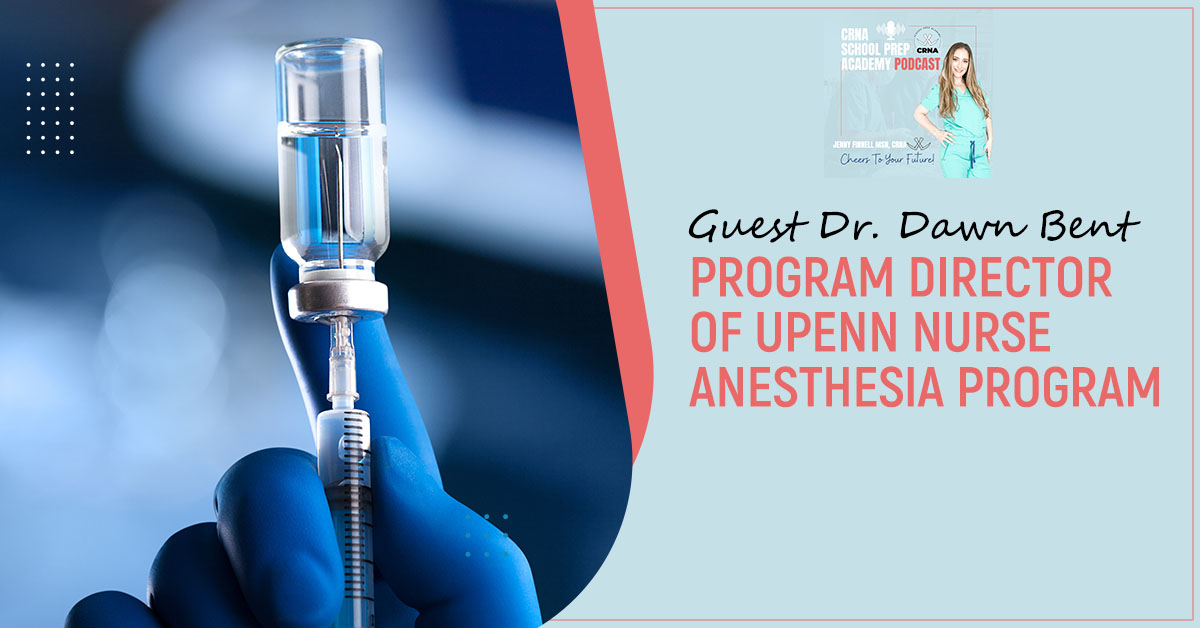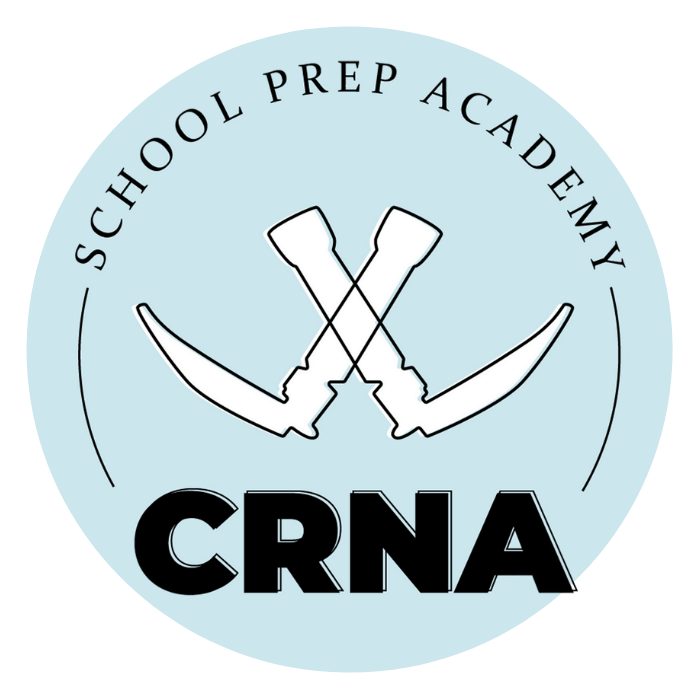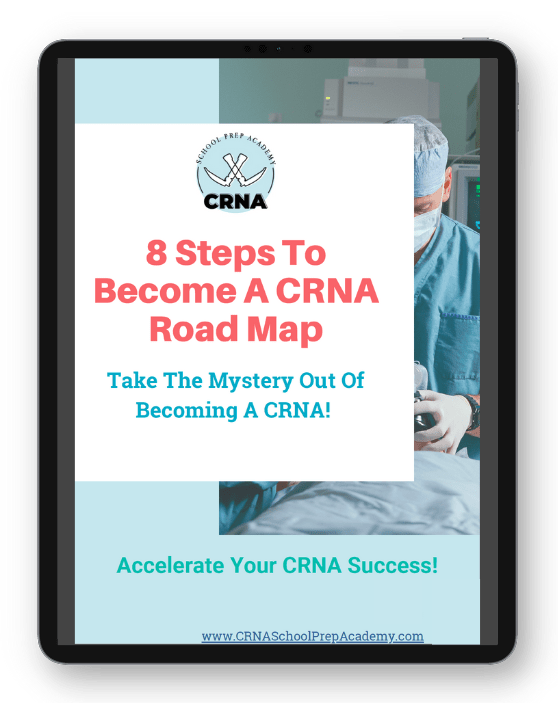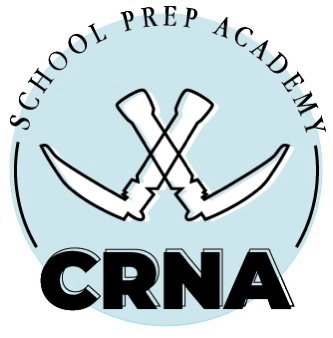
Got a few burning questions about the interview and application process for getting into CRNA school? While different programs will have different processes, gaining knowledge ahead of time is critical for planning and success.
Today, we are joined by Dr. Dawn Bent, Program Director of UPenn Nurse Anesthesia Program! Still clinically practicing in pediatrics, Dr. Bent has a passion for education and stands by her mission statement to help each student see that they can achieve so much more than what is in front of them.
In this episode, we’re diving into-
- How your GPA is broken down (and how graduate courses tie into calculating your GPA)
- The ways in which a program will take a holistic approach to evaluating applicants (GPA isn’t everything!)
- Questions you can expect in your interview and how to show up as your most authentic self
- How to navigate being put on a waitlist
- Planning the right ICU experience for your specific program
- Demonstrating emotional intelligence, teamwork, and openness to learning from your mistakes
And so much more! So pop in those headphones and listen in, future CRNA!
Get access to planning tools, valuable CRNA Faculty guidance & mapped out courses that have been proven to accelerate your CRNA success! Become a member of CRNA School Prep Academy here:
https://www.crnaschoolprepacademy.com/join
Book a mock interview, resume edit or personal statement critique:
Join us at the CRNA School Prep Academy Virtual Conference:
https://events.crnaschoolprepacademy.com/
UPenn Nurse Anesthesia Admissions https://www.nursing.upenn.edu/admissions/phd-and-dnp/dnp/
Bent on Education Podcast
https://podcasts.apple.com/us/podcast/bent-on-education/id1544662794
—
Watch the episode here
Listen to the podcast here
Guest Dr. Dawn Bent Program Director Of Upenn Nurse Anesthesia Program
I wanted to come on here to thank you guys for being loyal readers. I appreciate you joining me here every week. It means a lot to me, and I enjoy so much helping you along your CRNA journey. I wanted to remind you guys if you have not checked out CRNASchoolPrepAcademy.com, to go ahead and see what that’s all about. We would love to mentor you inside the academy. For current students, high-five and a big shout out to you. We appreciate you. We love all of you, guys. It’s exciting to see you grow along this journey. If you’re looking for more personalized guidance along your CRNA journey, it doesn’t matter where you are, we have people who are still in nursing school. I will say something about the nursing school though- I do think that the ideal time to join while in nursing school is probably towards the end of it or as a senior in nursing school, and from there on, you can be an ICU nurse for six years; or you could have just started your ICU journey. CRNA School Prep Academy will give you that one-on-one mentoring and guidance that you need to tackle your goals without hitting any roadblocks. I think the sooner you start investigating this career path, taking it on, and jump all in, the better and the more prepared you’re going to be. We do educational workshops and live Q&A sessions every single month. Again, those are things that are going to help propel you towards your goal and allow you to miss the barriers and the obstacles that may stand in your way, while getting the guidance you’re seeking. We hope to see you guys there. Now, let’s get into the show.
—
We have a very special guest, Dr. Dawn Bent. She is the Program Director at UPenn. She has been in the academic realm since 2008. I want to read you guys a special quote from her that displays her passion for helping students. It is her “desire for each student to see that they can achieve so much more than what is in front of them. Their knowledge will take them far, but their drive, aspirations and willingness to be visionary will separate them from everyone else.”. I got goosebumps reading that quote because that is such a cool concept. It shows her character and how she is passionate about helping students.
You might not know this about Dr. Bent, but she has a podcast. It is called Bent On Education. Check it out. It’s funny, when I first reached out to Dr. Bent, I ran into her podcast and I’ve been listening to it. She does it because of how much she cares about her students because she thought that she wanted to give her students more academic help, and what a fun way to do that by providing a podcast. She does this out of the kindness of her heart because that’s who she is as a person. Welcome, Dr. Bent. It’s so nice to have you here. Is there anything else you would like to add to that?
I think that’s great. It was funny because the inspiration for the podcast was I had students that were coming into our program and a couple of them had reached out to me and said, “Is there any way I can prepare? What can I do?” I was like, “Let me try to think of what they can do.” Some of them want to take a class and I was like, “Don’t spend money to take a class. I have the knowledge base to get you started.” I threw together a podcast, and it’s been great. It’s been helpful for me too as an educator because it brings me back to basics. I get to learn as well along with the students, and they don’t have to pay any money for it. That’s a win-win.
It is, for sure, and your passion for education is there too. It’s funny because I always tell my students- what I enjoy a lot is that I learn from them. As an educator, you love to learn and learn with the students. That’s all great. This episode is going to be some generic questions. I think this is a cool idea to actually have a faculty member and program director on the show. I always stressed you guys need to hear it from the programs themselves because there are so many unique factors at every school that needed to be considered. As you know, especially for some students who are applying to 5 or 6 different schools, you have to look at every school in a unique way and tailor the application to them as a school. You have to know exactly why you’re picking that program too and not have it blend in with the rest.
We’re going to have Dr. Bent answer some hard questions and she’s totally cool with that. We’re going to go ahead and get right into it. The first thing I would love to dive into is talking about GPA and your thoughts on how some schools break it down as far as the last 60 credit hours, versus science, versus overall. Also, looking at current courses, such as current graduate courses, retaking courses, and how all that plays into how they evaluate your GPA.
We do look at Science courses and that’s over the course of students in the BSN program. I do have students that reach out to me and say, “I didn’t do so well in this and that. Should I retake this class?” First, I do look at their Science GPA and we can probably talk about this later too. Sometimes, the snapshot that you get of a student in their four years of an undergrad program is not who they are now. We’d like to take that into consideration as well and look at the holistic person. Students have asked me, “Should I retake this and that?” I leave that up to them solely because sometimes, I feel like it’s not just that little piece of information.
There are classes at Penn that they will look at and say, “This is not as rigorous at this college as it is here,” so they might want you to take it at Penn. There are little nuances in each program that students would have to reach out to the assistant director or the program director. Sometimes, even the admissions office will have that information for you, but reach out to the people that are in charge.
They will be the best ones to give you that answer. I know that for us, GPA does play a part in it. It has to, but holistically look at the applicant, “What else are they doing? Are they doing leadership? Are they precepting students on their unit? Have they helped with projects in the hospital and on their unit to improve the things that are going on there?” You have to holistically look at the student because they are taking care of patients in that same manner. That’s how we look at it.
While you do still look at the last 60 credit hours, as well as these and overall, you look at more than just grades. It’s interesting you mentioned how you compare where they take these classes because a lot of students, especially now, are looking for something that’s convenient when they’re still working. They look for online community college courses. While that’s all great, very convenient and more affordable, it may not be looked at the same as something as a brick and mortar like a UPenn Chemistry course or a known university. There are so many of them out there these days. That’s good to know for the students considering taking extra classes.
You have to holistically look at the student because they are taking care of patients in that same manner. Click To TweetThat’s why it’s so important to develop that rapport with the programs that you’re interested in, and if you have any concerns about your GPA or Science GPA, reach out to them and see where they are as far as that’s concerned. As you said, every program is so different in some respects from what they are looking for in a student. Some will take students that only have a 3.5 and above. Are we eliminating students that have that drive, passion, and are going to work hard? Every program is going to have its different nuances, but definitely reach out to those programs you’re interested in.
Are transfer reviews something that your program occasionally will do, or is that something that you tell them to look at and break down themselves?
We tell them to break it down themselves because you can imagine, we get about 141 applications every year. If we’re looking through everybody’s transcripts and figuring things out for them, it’s hard. The other part where you’re walking a fine line is that you don’t want to tell somebody exactly what to do and then they don’t get accepted. Obviously, there are qualified applicants that aren’t going to get accepted to programs because you’re limited to the number of students that you have each year.
We have to walk that tight rope in that respect. We guide them in that direction but not go, “You need to take this and this,” because you don’t want it to come back and bite you either where they’re like, “You told me to take these classes and then you didn’t accept me.” You’re like, “I know, but there were 28 spots and 60 qualified applicants. We do have to choose a little bit.”
You said all schools are different. I know at least one program because of the program I went to. That’s why I know because I talked to that program director, but they don’t accept retaking courses. Do you find that to be a common or uncommon theme across the board?
I have found that students are saying, “I want to retake Pharmacology, Chemistry and all of these things.” It’s still your Bachelor’s degree program. If you’re going to take a course, take a graduate-level course because they’re more rigorous and the program director can actually see like, “How is this student going to perform at a graduate level taking those things?” It will improve your GPA ever so slightly. It is worth the risk versus the benefit of taking it.
I hope that gives you some clarification on some things, but again, the big takeaway is that it’s not super straightforward and there are so many moving parts to it. Going to these open houses and getting to know your program is the best way to come at this. If you had a student, let’s say they had a 3.8 and they just took a Chemistry course. Maybe they dealt with some personal issues and what if they got a bad grade that was current. Historically, they had a good GPA, but then they have a bad grade currently. Would that be a big red flag to you essentially?
It’s not necessarily because if I’m looking holistically at the person and that was somebody that I was bringing in to interview, that’s a question that I would ask them, “What was going on with this class?” The students are very forthcoming with that. I find that too, even with their undergrad, because as I said, we’ve interviewed students who barely had a 3.0 or 3.2 and they’ve been accepted into the program and things like that and that’s because, “You tell me what I’m supposed to tell admissions when we say, ‘Yes. We want her or him.’” Admissions look at me and go, “You’re going to take this student over this student?” They are like, “Yes. It’s the interview.”
We can talk about the interview process too and you get a gut feeling of how hard these students are going to work for themselves and subsequently for the profession that they’re going into. A recent bad grade, if it’s something you can explain; people have parents that get sick, they have children that are not doing well or whatever it is. You have to be able to listen to that and act as a person too. You can’t look at A, B, C and D all the time.

That’s awesome that you would have that to share with everyone. I love to touch on the interview because as you said, you get that gut feeling. I also love how you mentioned the work you’re willing to do for yourself because you have to hold yourself accountable during grad school. No one is going to hold your hand and walk you through it. If you’re going to do something, you have to take it upon yourself to do it. It’s a big shift. Don’t get me wrong. College is adult learning in my opinion, but undergrad to grad school is even more of that shift, especially at this DNP level.
I always tell students a lot of times too because they’re like, “Is it really that hard?” It’s a yes and no. No, because you’re going to enjoy learning it because it’s cool information. It’s enjoyable. It’s so rewarding. Yes, in the fact that it’s so much at once that it can be very overwhelming. If you’re not in a good mindset to take that on; time management and the support system are some key things that need to be in place prior to starting the program to withstand the amount of information and work that’s thrown at you.
It’s funny because the students laugh at us after the fact, but one of the questions we asked them at the end of their interview is what do you want to do for fun? When they get into the program and they are like, “I’m stressed on this amount and the other.” I’m like, “What was it that you like to do for fun again?” They are like, “I like to run. I might go run.” You have to still have that home base that you go to when things are up to here. They look at us like, “Is this a trick question?” It’s not a trick question. I don’t want you to say, “I read nonstop all the classics.” That’s not the answer. The answer is what do you like to do for fun because I want to know that you can turn to that when those stresses of your 1st and 2nd semester kick in; clinical just getting started and they kick in. You have to be able to go, “I need to step back and I need to go hike or swim.” It’s very interesting.
I’ll throw you off the beaten path a little bit but are interview questions meant to be so secretive? It feels like one of those things. Historically, in my time doing this, people are like, “Oh.” If you have a network, you can always find out, but the thing is you never know exactly what they’re going to ask you. Is it meant to be a secretive process, or do you guys explain to your students what they can expect?
Some of the students do reach out. I feel that most of the programs will interview you in almost the same way. They’re going to ask you why you chose their particular school. They want to know why you want to come to the University of Pennsylvania specifically. They’re going to ask you about your experiences on your unit, any kind of preceptor leadership opportunities that you’ve had, and what you have done with them.
From there, it could be a little bit different. They might ask you a question, a scenario of, “This is happening in the OR and this is what the CRNA and/or the MDA says to you, what do you do? How do you react? There has to be a way to gain what the person’s emotional intelligence is in a stressful situation and you’re doing hypotheticals, but hypothetically speaking, how would you respond to this?”
A lot of times, you can tell the students are actually being very like, “Is that going to happen?” “This is what I think I would say,” and you’re like, “That makes a lot of sense.” I don’t think it’s a secretive process. Sometimes, the students feel like it’s going to go off the rails. They’re going to ask you about medication. Know your medication. They may ask you about patients that you’ve taken care of. Have you dealt with a difficult family? The students know, but they don’t have the exact subject-verb, adjective, and then question mark, period in the end. It’s a little bit nerve-wracking for them.
I agree, and you’re right. They’re all very similar, yet they’re all a little different. Some are heavy foreign Pharm-Pathophys, even some have Math or on-the-spot essays. Some are all about that emotional intelligence piece. Some are laid back and just getting to know you and that aspect of it. As far as focusing on a particular question, I was like, “Don’t worry about that because that’s going to change. They’re going to bring in different interview panels.” There’s no way to predict. It’s more about just preparing broadly, not so you sound rehearsed, but so you’re comfortable in your responses and what you believe in your foundation. In your opinion, how important is the in-person shadowing versus say nowadays, it’s so hard to get? What are your thoughts on that?
A lot of people get involved in the profession of being a CRNA because the pay is really good. You want to break that down a little bit. Have you ever seen what a CNA does? Click To TweetThe interesting thing is that we do ask our students, “Have you shadowed a CRNA?” It’s more so, “Do you know what the job entails?” We could put it out there. A lot of people get involved in the profession of being a CRNA because the pay is really good. You want to break that down a little bit. Have you ever seen what a CNA does? Nowadays, it’s a little bit different. It’s difficult. If you’re not in a hospital that has CRNAs and things like that, it’s hard to get into the ORs because no one’s letting people in. COVID has changed all of that for us.
We can’t hold students responsible for having an experience that they can’t have based on what’s going on. We have not yet interviewed a cohort that hasn’t had a shadow experience, so we’ll see. We will start interviewing again and I’m happy to come back and let you know how that went with the interviews. If students actually did not get to the shadow CRNAs and how we look at it, I think most programs and I should just speak for Penn…We want to know if you know what a CRNA does. What was your experience? What did you enjoy about the day and what did you not enjoy about the day?
For those of you reading who are struggling with this, and I know some of you are even traveling out of state. Jeff Molter, who is a friend of mine, is an amazing person. He has probably helped place maybe 300 or 400 students across the country with his connections. I know many want it so bad, but they can’t get it. If that’s what you’re struggling with, would you encourage me to reach out to your school and let them know that you’re struggling?
Yeah, I would, especially during the application process. I believe we asked that question, “Have you had any shadow experience?” If the answer is no, it’s no. It’s not something we look at and go, “This person didn’t shadow,” and we’re throwing the baby out with the bath water or anything like that. It’s to gain knowledge about this person like where they are. I would reach out and say, “I haven’t had any shadow experience because of COVID-19 or whatever it is,” just so that the program will know that you haven’t been able to do that.
That’s a good point and speaking to that, I’ve also talked to other program faculty. Historically, they would make that a rule-out question where if they hadn’t gained that experience. This was back before COVID though. They would say, “This student could have a great interview, but if they hadn’t shadowed, it was like, ‘Eh.’” It’s a big indicator that maybe they weren’t as invested as they should be in the profession, but things have changed again because of COVID.
If you’re struggling, reach out and let them know. I do a virtual shadow experience where I spent three hours walking through an entire day and doing a commercial checkout with Draeger online. There are ways to still get a good idea of what CRNAs do, what they have to do in pre-op, and the whole nine yards. Seek out those types of opportunities if you can find them. That would be a good thing, at the very least.
Knowing what the CRNA does and having a good understanding; that’s why they want to see if you shadowed because they want to make sure you have a good understanding of what CRNAs do on a day-to-day basis. Let’s go into a little bit about ICU experience. I have students who struggle with this because there’s the level I, II, III or no trauma, ER experience, flight nursing, PICU, and NICU. Let’s start with the different trauma designations or not trauma designations. What are your thoughts on that?
We don’t separate based on level I or II trauma. A level I trauma will give you the whole kit-and-caboodle of all the patients, and that’s fine, but you would find there are some of these students that work in a community hospital ICU. They see patients that some have not seen because they’re it for a while until they can get to a tertiary care center that’s outside. They have taken care of the balloon pump. They have done all that stuff. They stabilize the patient and then 6, 7 or 8 days later, the patient goes to wherever they go to.
The trauma designation isn’t as important for us. When we look at ICU experience, surgical ICU, CVICU, CCU, and MICU are great. A lot of the students that apply come from a NICU. They have a lot of good experience. They seem to nail the respiratory aspect when we talk about that during the interview process. We don’t take ER experience. That’s one thing that at Penn, we decided it’s more like stabilizing the patient and sending them on their way. The experience with drips and vasoactive medication is difficult if you work in an ER to have that experience.

PACU is the same thing. You might see that patient for an hour or two and then they go on to the ICU and you’re not really doing the titration and considering all of the things that are going on with that drug. The other aspect, Pediatric ICU patients, from little 750-gram babies all the way up to big kids, 18 to 19 years old who are 75, 80 or 90 kilos sometimes. You get a whole gamut of that patient population.
NICU, not Neuro ICU, but Neonatal ICU. As of 2021, we stopped taking Neonatal ICU experience, which I know is sad. The people who are in the NICU right now, I apologize, but what we saw across the board, and as I said, I’ve been with Penn since 2008 as program faculty and now program leadership. The students that came in with NICU experience, do we get them through the program? Yes, absolutely.
It’s because that’s our job. We feel that once a student is in the program, it’s our job as program leadership and faculty to get the students through the finish line, but they struggle a lot in the very beginning because they have now the adult patient. They’re not used to that. NICU babies are a very different and specialized population of people.
It was a little bit harder for them to pull in the reins and try to figure out these doses. They’re so big. We’re like, “No. They’re based on the patient’s weight. It’s fine,” but they struggled a lot with that. When I say that, one thing is that the NICU and the PICU nurses come to us with its precision. You’re taking care of one day, it might be a 5-kilo baby, the next day, it might be a 15-kilo toddler and you can flip that switch easily.
The Neonatal ICU nurse is a specialized population and trying to get them through that first nine months, they struggled. They were tearful and all of these things. That’s what we saw across the board. We’re like, “These students are struggling in this aspect.” When students reach out to us and say, “Do you take NICU experience?” We say, “No, but get yourself into a Pediatric ICU and go from there.”
I came from the NICU and then I had adult CRNA experience. Now, I’m in pediatrics. As you said, in one case, you could be taking care of a 5-kilo baby, and then that could be a 17-year-old who’s bigger than most adults. It isn’t a doll. It’s flipping back and forth. We also do burns. We do to get kids, but a lot of it is adult burns.
It creates that flexibility of being precise but flipping back and forth all the time- that’s why the NICU is great for that. The actual neonatal is such a small range of patient populations that you take care of. You’re going to struggle a little bit more. It doesn’t mean it’s not possible. Some schools do, some schools don’t, but it’s so important for you to know this ahead of time especially since you just changed.
Especially because they could have been researching your school for the last few years and they took that NICU job. That’s why you guys need to be frequently, every year, looking at the requirements on their website and making sure nothing has changed. That’s good to know. I even tell students not to be afraid if they don’t have a PICU they want to go to. Get that adult experience and make a plan for pediatric CRNA in the future.
There’s nothing wrong with that too. You don’t have to give up taking care of kids forever, but to get into school and to make yourself a competitive candidate, it’s adult experience if the PICU is not your thing.
“I can teach you anesthesia, but I can't teach you personality.” Click To TweetWe’ve touched a little bit with you guys on ER experience and how it’s short-term management. That’s also the same with flight nursing because it’s short-term management, they want to see longer management of these critically sick patients versus the short-term. In PACU, it’s the same thing. It’s short-term. Where I’ve worked at the level I traumas, we don’t take those sick patients to the PACU. They go straight to the ICU.
Even those nurses don’t like when we drop those patients. I don’t blame them. I’m always happy to drop them off. What’s the reason behind that? How do you feel about extra certifications? I have some students who have alphabet soup and I’m curious at what point is there a line drawn where maybe it’s not necessary? How do you feel about that?
I personally feel like your CCRN is plenty. Again, that’s Penn-specific. Some of the other schools that you’re applying to may say, “The more certifications, the better,” but I think the CCRN gives you such a good base of understanding of the critical patient, and that’s plenty. Everybody has their ACLS and if you’re in peds, you have pals and so on and so forth. I don’t think trauma certification, CEN, and all of those things are not necessary for school.
I’m not saying by any means that students, if they want to pursue that on their own, go ahead but don’t feel that it’s necessary all the time for a CRNA program and to get into a CRNA program. Most of them will look to see if you have your CCRN.
I’m curious myself because I know some schools do a scoring program on the application process, plus the interview. Do extra certifications give you an extra point?
Not for us. It doesn’t.
That’s good to know and again, this can be different so it’s not a blanket statement.
Make sure you check with the school that you’re applying to, for sure.
That’s also very reassuring, the fact that if you were just going to get it because you think it’s going to help boost you. If you already have a rocking application and you rock the interview, it’s not a necessary kind of thing. Let’s go ahead and go into the interview since you’ve mentioned that. I’ve always been stressed. This is one of the most important parts. The application will be the interview.
The interview is what solidifies the deal. I even have had program directors who tell me, “Jenny, once students gain that interview, are they all on the same level playing field?” Not always. Again, some schools score you based on interview application points, but some now are an open playing field. Meaning, that they evaluate you from who you are from that moment on.
That’s 100% true because as I said, in the last two application cycles, we’ve had over 140 applicants. We only interview a little less than half of that. If you’re in that 50% that we’re interviewing, we’re like, “There’s something about this person that I want to get to know more about.” They are on an even playing field at that time. The interview process, for some students, is more stressful than for others. Some students blank during the interview process.
You’re asking them about a patient they took care of and they’re like, “I haven’t taken care of any patients.” You’re like, “Yes, you have.” It is stressful to come in with as much confidence as you possibly can. It’s hard to tell students where the line is between being confident and being cocky in an interview.

I feel like most of the students understand, “I’m in the top 50% of the applicants for the 28 spots that they have.” We have 28 admit, but at that point, it’s being your authentic self and that’s what I stress. Me and Dr. DiDonato, who is my Assistant Program Director, that’s one of the things that we definitely have in common. We want students who are authentically themselves.
You’re not the next person. Jenny’s not Dawn. Dawn is not Jenny and so on and so forth. Be who you are because it’s so easy to see when students aren’t. There were a lot of canned answers to the questions that you’re asking them. I want them to be who they are. I gave you the example, “What do you like to do for fun?” “I like to read Charles Dickens.” “Do you really or is that what you thought we wanted to hear?” Be your authentic self.
It’s funny you say that because in my time doing mock interviews, one of the things I love to give my students and it clicks at the end… I’m like, “I could tell they were holding back.” What hurts me too, is when I read someone’s resume, for example, and then when I interviewed them, “You did not do yourself justice on your resume because you are awesome. I wish we could highlight some of these awesome things that you shared with me.”
That could be the other thing too, is maybe they’re not giving themselves enough credit on their resume by not being descriptive enough about why they got this award. What is this award about? As you said in the interview, you are holding back and telling them what they think they want to hear. Trust me. They never want those answers. They want to know you as a person because you’re going to be working with each other over the next three years. It’s a relationship.
You made me think about something. In the interview process too, I feel like students have to understand that the interview panel or the leadership of the program is putting together a cohort of students.
Although you may have a 3.8 GPA, all the things and whatever, if we’re putting together a group of people that have to stay together for three years, there are many times in the interview where we’re like, “She’s going to be good friends with her and he’s going to be great friends with her or him,” and stuff like that. It’s not random individuals that we’re picking up and saying, “They’re going to be amazing on their own.” That’s not going to work. They’re going to need those 28 or 16 friends or whoever they are for the entire three years.
They’ve got to stick together like glue. That’s what we try to see during that interview process like, “What do you think about how that person would fit into an entire cohort of students?”
I love that you said that because I always stress that. I love my husband. He’s amazing. He is my backbone, but when I was in the thick of it in school, who helped me the most were my classmates because they knew what I was experiencing both physically and emotionally. They knew the stress that I was under where my husband is just crickets.
I’m like, “I’ll go cry in the shower now.” You do need that cohort or those peers to help you along. That’s cool that you look for stuff like that. I’m curious since you mentioned your program has 28. Do you always take 28 or are there some years you take maybe 27 or 29?
We can’t take over 28. That’s Council on Accreditation. That’s what we are slotted for. We’ve had in the recent years maybe 26, and why? Because maybe months before school starts, someone’s like, “Can I defer my application to the following cohort?” Of course, we’re going to say yes. Some people are like, “I got accepted to this program. It’s closer to my home.”
That’s fine too. We’re not going to rush and try and fill that spot. We had a student that was waiting on the waitlist and they were like, “Any spots open yet?” We know that they’re like, “Three months before, they’re going to figure it out and they’re going to jump in and they’re going to be okay, but we don’t like to pull someone say, “By the way, we have a spot open. Do you want to come?” It causes so much stress for the student themselves not being ready to be there in 90 or 60 days. There are times that we do take less, but we try and shoot for 28 per cohort.
That’s cool that you said that too because when you’re on a waitlist, don’t just be silent. If you want off that waitlist, make sure you’re checking in. People would ask, “What can I do once I’m on the waitlist?” Is there anything that they can do to help them get off the waitlist or is it a set order?
“If you think you're not going to make some bonehead mistake when you're an anesthetist, think again.” Click To TweetIt’s funny because everyone on the waitlist is on an even playing field. There are times when we’ll go, “This is our 1st, 2nd, or 3rd person off the waitlist.” There’s not a whole lot of room unless those scenarios happen that I told you about somebody wants to defer to the following year, somebody decides that they want to go to a school closer to their home to have that family support or whatever it is.
We accept students a year out. Every couple of months, “Just checking in. This is what I’m doing.” It shows that interest. Again, there’s that fine line between checking in every couple of months and emailing every week like, “What’s going on?” Students figure that part out too.
Being on the waitlist is tough. I can imagine that because you’re in limbo in some respects and the program starts and you’re like, “I guess I didn’t come off the waitlist.” You feel bad about that because they’re great students. It’s not anything about the student themselves. It’s again, the limitations on the spots that you have.
I always tell people that if you go to a waitlist, it means you were accepted. They just don’t have space right now for you. Don’t see it as a defeat that you’re never going to be able to do this. It means you got to keep going because you’re so close.
A little tweak here and there and you’re going to get that yes. How do you feel about a student who has a high GPA versus a student who has high emotional intelligence but a lower GPA?
We’ve interviewed students with very high GPAs and they have very low emotional intelligence. I can tell you that as a person, I can teach you anesthesia but I can’t teach you personality. That’s how I go into that process when I’m interviewing students.
You can have the highest GPA and so on and so forth but when your emotional intelligence is down, it’s hard. When something happens in the OR, a mistake is made. It’s hard to get that student to see that part. They’re like, “Well.” You’re like, “No well.” We have to take ownership and that’s okay. I’ve had students with lower GPAs but great emotional intelligence.
Those are the ones who are there early all the time. They want to make that impression. If something happens in the OR, they learn from that experience and don’t look at it like, “The preceptor was not in it. She was mean to me. He was mean to me.” I’m like, “Let’s try and maneuver through that part.” It’s easier. As I said, I can teach you anesthesia and these things, but I cannot teach someone’s personality. It’s hard to maneuver through that aspect.
Being a preceptor in the clinical realm too, it’s so nice and refreshing. We have a student who does take that ownership because that’s where you learn and grow. Even as a CRNA, you will always have those moments. If you don’t ever take ownership, you’re missing a huge part of what you can gain out of that experience.
The students laugh at me because I said, “If you think you’re not going to make some bonehead mistake when you’re an anesthetist, think again.” I had a situation where I forgot to turn the vent on manual when I was getting ready to extubate a patient and I’m like, “I cannot create positive pressure. What’s going on, this and the other.” The MDA I was working with is like, “Doofus, you’re still on.” I go, “Oh.”
I’m still in pediatrics. If I can share these moments with my students, they understand that I’m human too. I’m not 100% all of the time. I still keep my patients safe, but I’m still going to make mistakes. I go, “I didn’t turn the vent on manual. I got it,” and I’ve never done that again. It’s still those learning opportunities that you have.
I want your thoughts on the GRE. I know a lot of schools are turning away from it, but it’s still a huge debate. I have some students who were even saying, “Jenny, all the applicants are flocking to the schools that don’t require the GRE and are more competitive.”

We just got away from the GRE too. In this new application cycle, we’re not going to require the GRE. GRE is like any other of your standardized test. Students are sometimes going to perform well. Students sometimes aren’t.
They’re not congruent necessarily with their academic profile all the time so it’s hard to say, “We’re getting the best and the brightest based on their GRE score,” when you might have somebody who they’re like, “I have no idea. I totally bombed that. My writing was a 3.0.” It’s stuff like that.
That was tough and I think basing anything on giving a student a go-point system, for example, for your application process and you get X amount of points for your GRE, you’re already taking a lot of people out of the picture. The best indicator other than the GRE when you take the GRE out, which we should when we did, is that it’s going to be the interview.
You’re going to learn about the student by their application, by their resume, by the essays that they write you, and by their transcript so that when I see this person and I talk to this person, that’s going to give me the best indicator. Now, the point is getting to that point and interview. You have to make it yourself. You keep saying, “Be as competitive as possible.
Make sure that you give yourself the credit for the things that you’ve done.” As you said, what are these awards? I don’t know that they are. This hospital is different in what awards they might give a nurse and things like that. If you explained to me like, “You were the one who did this. That’s really impressive to me.” I think all of those things tied together will help the students.
How long do your interviews take? It does come down to your interview. Some interviews are 10 or 15 minutes. Some are an hour.
We typically interview students for about half an hour.
We’ve got a half-hour to gauge the relationship and who you are as a person. That’s still a lot of pressure to be under.
They come in and we start right away. We don’t give them a lot of information. We’re not doing all the talking. We’re asking you a brief question and we’re going to let you talk through things. We’ve had students come in and they ask us questions and we’re like, “This is interesting and it’s fun too.”
Thirty minutes is a long time to sit in front of two people that you don’t know very well. Angela and I do our interviews solo. We don’t have a panel. We’re going back and forth. We felt a little like, “A panel interview sounds a great idea,” but then when we’re like, “That’s nerve-wracking.” All these people are shooting questions at the student, and you see them. They start turning red, and you feel bad for them.
Probably the smaller one would be more personable and make me feel more at ease. That’s always a good point to make. I guess when it comes to preparing for the interview, I’ve heard students say that they can do better when they give up that control of being perfect.
Take the pressure off of you because it will allow you to relax a little bit because it’s either going to get into you or not. Those are the two options. If you don’t, what’s the worst outcome? You’re going to try again. The people don’t get in as far as asking for feedback, one of the probably most frustrating answers students get is “it was a competitive application cycle”.
It’s always a competitive application cycle. That’s how I feel. When students reach out to us when they don’t get in, I will go back and pull my interview notes that I have for the student and go through what I feel they can improve on. Whether it is, “We talked about the unit that you work on, a certain disease process, or pathophysiological process that the patient had but you were a little not too sure of this and that.”
GRE is like any other of your standardized test. Students are sometimes going to perform well. Students sometimes aren't. They're not necessarily congruent with their academic profile all the time. Click To TweetSome of it is just confidence. The student has a little bit more confidence in themselves to be able to explain these things because we know when they get in the OR, they’re going to be on the hot seat and people are going to shoot questions at you like, “What’s the Maxcebo? What’s this?” You’re like, “I don’t know. I forgot,” and things like that. I will go back because we’ve had students reach out and say, “What can I do to improve my application,” for example.
I’ll go back, pull their application and interview notes and see because I usually note if we’re not going to accept somebody. I usually put why, “Less experience, needs a little bit more experience in their unit. Was a little hesitant on medication, the mechanism of action and things like that.”
When I have a student that reaches out to me, I go back because I feel like I owe them something a little bit more than just the generic, “It was competitive.” It’s always going to be competitive, but how can you separate yourself?
I could probably talk to you all day but I want to be respectful of your time. I have students who reached out to me who say maybe they think they’re not smart enough, they’re too old, they worry about juggling school with kids, or they worry about affording CRNA school.
What are some resources or how do you juggle students who question that? I’ve had so many students who get accepted and then question whether they can actually do this. It’s heartbreaking to see.
One of the things is that I always turn the question back to them and I ask, “Do you want to do this?” That’s first and foremost because if you want to do it, you’re going to find a way to do it regardless of what you look at as perceived barriers to doing it.” My daughter was 3 to 5 when I went through the program. Was it difficult? Yeah, because you’re doing work and you’ve got this toddler.
They are like, “Let’s do this.” You’re like, “I can’t.” You find ways to do it. I would sit on the ground and read. We’d watch TV together. She was doing the TV watching and I was doing the reading and that’s fine. If you think you’re too old to do it, you only got to think again because you’re not. The question I do turns that back to the student and goes, “Is this something you want to do?”
If the answer is yes, then we’re going to figure it out but when you figure out all of the excuses, why, maybe, or not, then they have to look within themselves like, “Maybe this isn’t something that my heart is set on.” That’s how I handle those questions.
I interviewed Eslyn and she’s 58. She’s getting back to school. She’s inspiring. You only limit yourself when you believe you have limitations. If you want something, you can figure out a way to make it work. Obviously, be smart about it and evaluate it.
Talk to your support system. That’s why before you even apply, you need to be thinking through these things because you don’t want to get to the point where you gain acceptance or even start school only to leave because then you decide it’s not the right avenue.
You then have time and money involved. Think about those things. For everyone who’s reading, if they want to pursue CRNA, what should they start doing that you think would be the most helpful thing for them to do?
I would say finances. Start getting those finances in order because you’re going to get in school and you can’t work. Some programs may allow you to work one weekend a month or something like that but for the most part, you can’t work. Getting your finances straightened out a little bit and paying off what you can is one of the best things that someone can do for them themselves.
You’re the second person who has mentioned finances are one of the key things they should start doing prior to school. For a lot of people, even including myself speaking, I knew it was a commitment, but it wasn’t on my radar because you get bogged down with everything else, the GRE, the CCRN, the interview and the ICU experience.
You forget, “I’ve got to pay for school.” Not going with credit card debt is huge. I’ve also heard you guys that the best investment you can make financially is in your education and in your career because that’s going to pay you in dividends. No other investment is going to pay you year-after-year what you can make in your career.
Even though it’s a big investment for CRNA school, you’re going to be increasing the lifetime value of your career. It’s going to pay for it 10 or 20 times over. Thank you, Dr. Bent. This was such a great interview, and I appreciate your time. We’ll definitely bring you back on the show in the future. I’m excited.
You’re welcome. Thanks for having me. It was my pleasure, Jenny.
You take care and until next time. Make sure you like and follow me, whether you’re watching this on YouTube or the podcast. Head over to check out Bent On Education Podcast by Dr. Bent herself. She teaches some awesome things on there.
Important Links
- Dr. Dawn Bent
- Bent On Education
- Jeff Molter
- https://Events.CRNASchoolPrepAcademy.com/
- https://www.Nursing.UPenn.edu/admissions/phd-and-dnp/dnp/
About Dr. Dawn Bent
 Dr. Dawn Bent began her nursing career at Medical College Hospital in the Neuro Intensive Care Unit. She always knew that she wanted to work with children, and, soon after, secured an Intensive Care Unit position at St. Christopher’s Hospital for Children.
Dr. Dawn Bent began her nursing career at Medical College Hospital in the Neuro Intensive Care Unit. She always knew that she wanted to work with children, and, soon after, secured an Intensive Care Unit position at St. Christopher’s Hospital for Children.
It was there that she decided to forge ahead with her education, which led her to earn her MSN from Temple University with her certificate in Nurse Anesthesia from Pennsylvania Hospital’s Nurse Anesthesia Program. Three years after graduation, her mantra to “always say yes to opportunities” brought her to the University of Pennsylvania’s Nurse Anesthesia Program as program faculty and simulation support.
Dr. Bent received her Doctor of Nursing Practice from Duquesne University in 2011.
Get access to planning tools, valuable CRNA Faculty guidance & mapped out courses that have been proven to accelerate your CRNA success! Become a member of CRNA School Prep Academy here:
https://www.crnaschoolprepacademy.com/join
Book a mock interview, resume edit or personal statement critique:
Join the CSPA email list: https://www.cspaedu.com/podcast-email
Send Jenny an email or make a podcast request!
Hello@CRNASchoolPrepAcademy.com


